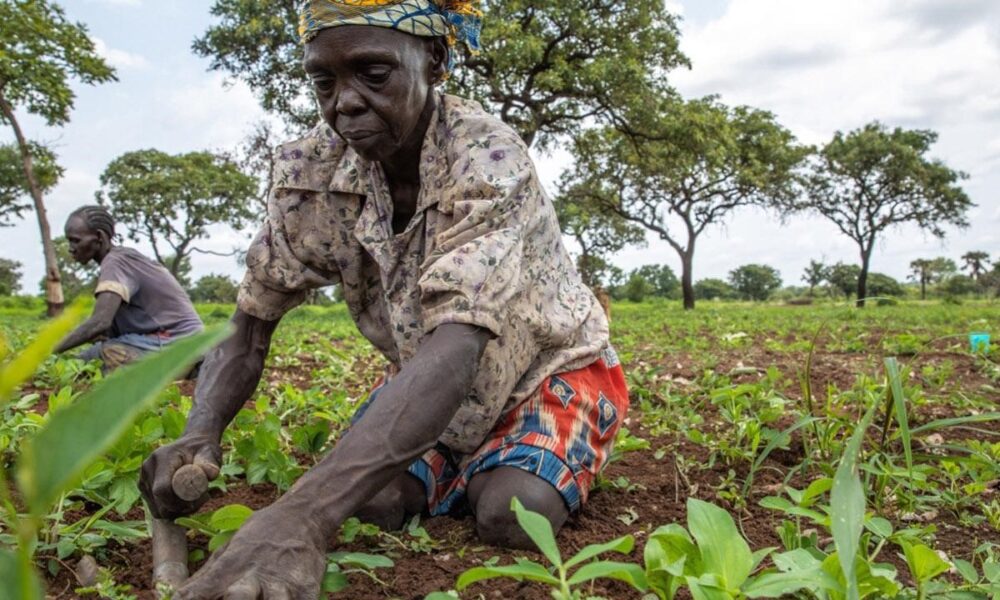By Philip Buda Ladu
The government and African Development Bank (AfDB) have signed a Memorandum of Understanding (MoU) worth $46.2 million to support the first phase of the Climate Resilient Agri-Food System Transformation Programme in South Sudan.
This initiative, which targets small-scale farmers, women, and youth in rural areas, aims to boost agricultural productivity, improve food security, and enhance the country’s resilience.
At the “Feed Africa” Dakar 2 Summit held in Senegal last year, South Sudan developed and presented a Food and Agriculture Delivery Compact to achieve food self-sufficiency in four key staples: sorghum, rice, sesame, and fisheries.
The national minister of finance and planning, Marial Dongrin Ater, signed the MoU on behalf of the government, while Themba Bhebhe, the country director for the African Development Bank, inked the MoU on behalf of his institution.
Speaking after the signing, Minister Dongrin expressed the government’s sincere appreciation to AfDB for its excellent and growing partnership with the government of South Sudan.
“We commend and appreciate the bank for mobilizing 46.2 million US dollars to support South Sudan in implementing the Climate Resilient Agri-Food System Transformation Program Phase One for South Sudan,” he stated.
Dongrin acknowledged the project as an investment under the country’s food and agricultural delivery compact presented by the government of South Sudan at the “Feed African” Dakar 2 Summit held in Senegal in January 2023.
“We commend the team led by the Ministry of Agriculture and Food Security for presenting a very good proposal that contributed to this success,” Dongrin emphasized.
The finance minister underscored that the prioritized four value chain activities, including sorghum, rice, sesame, and fisheries, are important value chains to South Sudan, among others.
This 46.2 million-dollar project, according to the partners, will build on existing projects supported by the African Development Bank.
“We appreciate the efforts of the AfDB to continue building the capacity of government institutions under different projects being implemented, and we believe this will give the government the ability to manage projects,” Dongrin emphasized.
He, however, urged the Food and Agricultural Organization (FAO) to ensure constant communication with the government and, at the same time, strive to improve its coordination and collaboration, especially with the executing agencies, in this case, the Ministry of Agriculture and Food Security.
Mr. Dongrin assured that the Ministry of Finance and Planning, as a key point of entry for all donor-funded projects, will be ready to render support where possible.
“The government looks forward to continued cooperation towards building the capacity of South Sudan in all sectors. And I reiterate that our commitments will remain steadfast.”
African Development Bank Country Director, Themba Bhebhe, explained the significance of the MoU signed.
“To understand the context of this project, It shouldn’t be seen as a project; it should be seen as a vehicle for supporting the country’s food compact,” he stated.
In January 2023, the African heads of state responded to the food crisis created by the war in Africa and came up with a strategy for trying to increase food production in Africa.
It was against this background that each country was requested to come up with what they called a food production compact, and South Sudan prepared its own food production compact, which was presented at the heads of state summit on the “Feed Africa” Dakar 2 summit in Senegal.
Themba noted that the presentation from Minister of Agriculture and Food Security Josephine Lagu on specifics for South Sudan rather than focusing on everything that is being culminated in the projected MoU signed yesterday.
“This program is supposed to promote two aspects of those main crops: the production side and productivity,” he hinted.
According to the AfDB country director, this project supporting the government of South Sudan in combating food security will span five years.
The project will be implemented by the Food and Agriculture Organization (FAO) and the Ministry of Agriculture and Food Security in a hybrid implementation arrangement that gradually builds national capacity for project management.
An estimated 567,155 direct beneficiaries, including producers, processors, entrepreneurs, women and young people, staff from training providers, agricultural extension coordinators, and civil servants from the Ministry of Agriculture and Food Security, will be involved.
South Sudan is ranked as the third most fragile country in the world and the fifth most vulnerable country to climate change globally.
Agriculture is the primary source of income for about 95 percent of the South Sudanese population, employing around 70.5 percent of the country’s labor force. Despite 95 percent of the land being suitable for agriculture, only 4.5 percent is currently utilized.
In spite of this agricultural potential, South Sudan faces severe food insecurity, with more than 7.1 million people (63.1% of the population) struggling to access sufficient and nutritious food.



